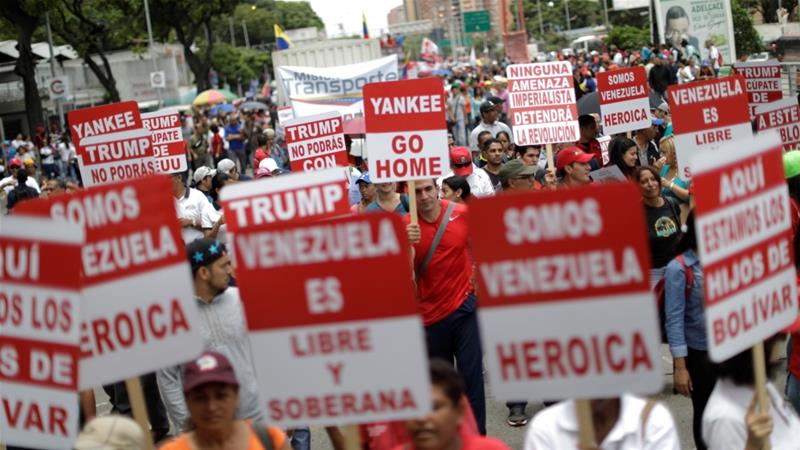Antonio Tujan Jr. | Crosscurrents 29, Philippine Tribune | 28 February 2019
The US strategy to bring down the Bolivarian government of Nicolas Maduro was to select Juan Guaido as a self-proclaimed president coming out of the defunct national assembly of Venezuela. Around 40 US allies from the West and some Latin American countries belonging to the so-called Lima group were quick to recognize Guaido, giving Maduro a 23 February deadline for Maduro to step down and for Guaido to call presidential elections.
The US hurriedly called a summit today February 24, at Cucuta, Colombia on the border of Venezuela where the Maduro government and people defeated the humanitarian invasion ploy. In defeat Guaido declared his famous line, “we will explore all options.”
After a quick diplomatic round to get Guaido recognized by its allies, the US ploy started with Guaido immediately appealing for humanitarian aid from the United States. Guaido claims it is mismanagement of the economy that caused the humanitarian crisis, but it is obvious to anyone that the cause of the severe hardship for the people were economic and financial sanctions imposed by the US on Venezuela. They were in retaliation to the nationalization by former President Hugo Chavez of the profitable US oil companies.
Are Venezuelans starving because of the sanctions? Independent (not US) media reports show that there are goods in supermarkets and groceries, but financial sanctions have caused hyperinflation which in turn created a lot of speculation whether for gasoline or groceries for example.
Indeed, life is difficult when the US is at war with you.
The Bolivarian government routinely receives different forms of Russian and Chinese aid, but it does not accept, nor does it allow, such unwelcome assistance which is being forced on the country by the US as part of its ploy to establish Guaido as president.
A quote from the Red Cross clarifies that humanitarian aid should be provided impartially – aid provided through the US-backed opposition is an obvious political ploy to unseat a UN -recognized government. Or as Guaido himself calls it – a coup. The US has no moral authority to offer but less impose its aid on Venezuela when its sanctions were the root of the hardship in the first place. Remember that the US sent aid to Nicaragua with arms hidden in the humanitarian goods to destabilize the leftist government there.
The Maduro calls this drama a “cheap show”. But the US was able to mobilize only Virgin Airlines’ Richard Branson to stage a concert to keep the crowd of some 20,000 occupied in the standoff. A cheap international show that is fodder for international media. Within this show is the convoy of eight trucks led by Guaido tries to force into country.
Indeed the Maduro government has previously intercepted small shipments of arms coming from the US. Thus aid can be a real trojan horse bringing in truckloads of arms along with the humanitarian assistance. The US has also prepared its Colombian and Brazilian allies to be ready for any military eventuality. Thus this can also become a humanitarian invasion which we can read about if ever it will be successful.
There are many parallels to the Middle East as recent comparison to the events in Venezuela. The US strategy for an Arab Spring was to use US-funded NGOs and bourgeois opposition to break the monopoly of autocratic or repressive Arab regimes from Tunisia, Libya, Syria, Egypt, Iraq, Afhanistan, Yemen, and others. US-funded forces were part of the broader popular opposition in Tunisia and Eqypt that brought down the dictators Hosni Mabarak and Zine al-Abidne Ben Ali.
The engineered unrest then prepared the way for arming the opposition as a ground force. It served to soften the politico-military landscape and provided the excuse for an invasion. This was the original role of Al Qaeda that later backfired on Pentagon. This was the role of the fake oppositions in Iraq, Libya and Syria – that allowed the US unilaterally invade with all the European powers in NATO to join the fray, and found the UN neutralized
The US strategy remains in force – but it has to adjust to new reality where it is no longer the single global hegemon. It is now second fiddle in economic power to China. It is still the main military power but Russia has overtaken the US in nuclear might. Iran and North Korea now has the gall to twit the noses of the US. In a new multi-polar world, Russia and China can easily counter US power with their own political might. Thus the hurriedly organized summit in Cucuta could not come up with a strategy of military action even with the US military as the main force.
If the US can send Nato bombers and ground troops in the Middle East, Russia can counter this with its own bombing of ISIS positions. The US can no longer simply invade Venezuela – it may try to push its ally 40 countries in Europe and Latin America but it cannot get whole of the European Union to support to isolate the Maduro government.
Its efforts to smuggle arms has been thwarted, its efforts to mobilize an invasion force by the Colombian border foiled. Part of the US ploy in the past was to break up the Syrian army through defections. Now three weeks of Guaido’s pathetic calls and offers for amnesty to whittle away at the Venezuelan army has produced only a few individual soldiers of the National Guards crossing over. The US and Guaido underestimated the consolidation of the Bolivarian government, military and people.###

